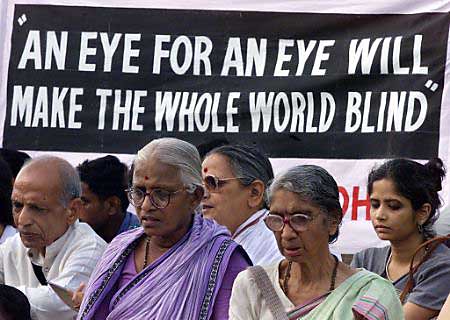And by the way, everything in life is writable about if you have the outgoing guts to do it, and the imagination to improvise. The worst enemy to creativity is self-doubt. - Sylvia Plath
Tuesday, February 13, 2007,9:39 PM
Sin, Discipline, and Vengeance
 In reading recently about discipline for home and school, I was struck by how our conception of sin influences how we approach discipline. Granted some sort of connection seems obvious, but I was intrigued by the difference it made in whether behavior and discipline became an individual or communal thing.
In reading recently about discipline for home and school, I was struck by how our conception of sin influences how we approach discipline. Granted some sort of connection seems obvious, but I was intrigued by the difference it made in whether behavior and discipline became an individual or communal thing.In the traditions I have been exposed to sin is viewed as an individual action. You commit a specific act - break a specific rule and you have committed a sin. Sin is a concrete thing that you (individual you) do. It is a very self-oriented/ it's all about me sort of thing. The focus is on what I have done wrong and then on how God will either punish or forgive me. I must repent of those sins for my own sake. I choose not to sin based on the reward or punishment I will receive. I ask - Will this send me to hell? Will this hurt my prayer life? Will this get me to heaven?
If sin is viewed less as concrete acts, but more as a state of the heart the issue becomes communal instead of individual. If being in sin means having a broken relationship with God or with others (failing to love God and love others with all your heart, soul, mind, and strength), the focus is shifted away from ourselves. Instead of focusing on ourselves, we put God and others before ourselves. Their needs and feeling become what is important. We choose not to sin because we care about God and others - we don't want to cause them pain. Caring for others is a value that is then upheld and the basis for the good things one does.
But the self-centered view of sin is what dominates our churches, homes, and schools. Children are not taught to care for others or to be aware of their needs. They are instead encouraged to make sure their own butt is covered and to tattle when others perform a wrong action. Instead of being encouraged to love misbehaving kids, understand why they acted out or made a mistake, and help them find solutions, our kids are forced to view these kids as bad examples who must be punished and ridiculed. The messages of love, humility, and compassion are ignored in a discipline structure where it's every man for himself. Why do we ignore Philippians 2:3-4 - "Do nothing out of selfish ambition or vain conceit, but in humility consider others better than yourselves. Each of you should look not only to your own interests, but also to the interests of others"?
One of the worst examples of this is how our modern Christian culture has taken a Bible passage originally intended to help restore relationships and made it a mandate for personal vendetta. The whole "eye for an eye" concept severely restricted vengeance back in the day. It called for a one for one exchange instead of the typical escalation of violence common back then (you killed my friend, so I will kill your friend, then your friend kill my friends, then my friends... until whoever is bigger, more powerful, or just more numerous wins). So instead of dragging a whole tribe into a petty argument and disturbing the peace (as well as economics, agriculture, the lives of all the innocents) vengeance was restricted. But even when Jesus' words are completely ignored (Matthew 5:38-39 "You have heard that it was said, 'Eye for eye, and tooth for tooth.'But I tell you, Do not resist an evil person. If someone strikes you on the right cheek, turn to him the other also."), this passage is taken as justification or a mandate to harm others instead of a way to help control violence and maintain peace. It become about getting our need for vengeance satisfied and not about loving others.
So if I want to take the Great Commandment seriously ('Love the Lord your God with all your heart and with all your soul and with all your strength and with all your mind'; and, 'Love your neighbor as yourself) I need to examine if that is the message I am sending in how I talk about sin and in how I discipline. If my desire is for Emma to be a person who loves God and loves others, are the things I say to her and the ways I discipline her serving to achieve that end? If not, am I willing to sacrifice habits, rote responses, and what may be easy in order to change?
posted by Julie at 9:39 PM
 ¤ Permalink ¤
¤ Permalink ¤
6 Comments:
-
I think you nailed it conerning how we see the sins of others. I do know that when I confess my sins I need to be specific, becuase when I generalize my sins, they lose their ugliness and horror. I forget what I am capable of. And when I am specific, when I lay it out it is amazing how God can say, yes I know and I forgive, and I love you.


















I've alwys been struck by Gandhi's quote...thanks for the visual reinforcement.